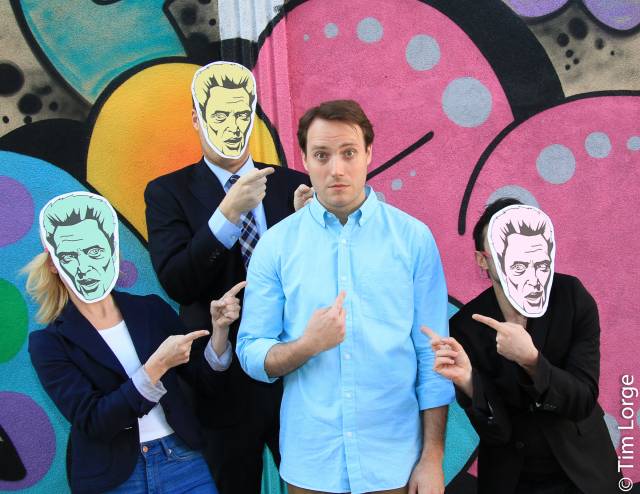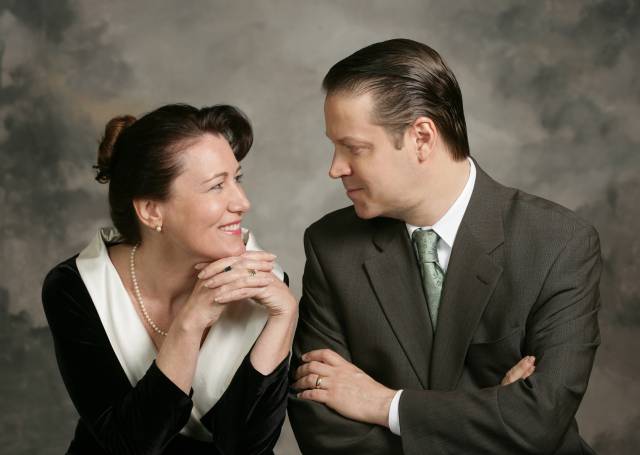

After learning that Christopher Walken never says no to a part he’s offered, down on his luck filmmaker Gavin (Dave Droxler) lies to his producers and tells them he’s cast the Oscar winner in his film. Now, how to find Christopher Walken? The premise of Walken on Sunshine is the material of a 10 minute sketch, which is why it’s admirable that Droxler’s script (featuring music by James Rushin) extends it into 90 hilarious minutes. From wacky Walken impressions courtesy of Droxler, to double casting so ingenious one wonders if a bigger budget would have allowed this to be, to a sense of “let’s put on a show” joy so infectious one’s willing to look past its flaws (although a few jokes are repeated much too often), the show is a scrappy crowdpleaser offering you its enormous heart on its sleeve. And who are we to refuse?
If there is one story we think we know all too well, it’s that of the birth of Jesus, but what Don Chaffer and Chris Cragin Day do in their gorgeous musical The Unusual Tale of Mary & Joseph’s Baby is to bring a sense of freshness into it, and point out that beyond its supernatural elements, the show’s “unusual” qualities mostly spring from the humanity of its characters. Take Joseph (a lovable Michael Castillejos) who upon finding his soon-to-be bride Mary (a spunky Ava McCoy) is expecting someone else’s child, is faced with the terrifying conclusion that he must decide between his pride and his love for her. Or Mary, who upon realizing the Romans are trying to murder her baby boy states to Joseph that she will do anything she can to protect him, whether he helps her or not. If obviously the show has been infused with 2016-relevant elements - for example, the whole production seems to have been put on by an indie folk band - its simple beauty (heightened by Amelia Peterson’s precise, but evocative, direction) makes it a timeless work.

Real life husband and wife Mark E. Lang and Alison Murphy star as real life married couple, and legendary actors, Alfred Lunt and Lynn Fontanne in Lunt and Fontanne: The Celestials of Broadway. The play written by Lang focuses on their time together which saw them not only live through some of the most harrowing moments of the twentieth century, but also saw them rise from penniless actors desperate for work, to becoming icons who would end up with a Broadway theater named after them. The show proves to be a wonderful history lesson thanks to Lang’s unique balance between the information provided and how it’s delivered (we learn that they thought of Montgomery Clift as their son and there is a recurring joke about Lynn’s rivalry with Helen Hayes that proves to be a hoot) and the joyfulness of their performances (they also play supporting characters which include Marlon Brando and Vivien Leigh, among others) make the play essential for theatre buffs.
Constant dissonance does not Sondheim make, but that didn’t stop composer Matthew Lowy from attempting to emulate the master in his musical Fallen Skies. The show chronicles the tumultuous marriage of D.H. Lawrence (Andrew Tighe) and Frieda (Catalina Gaglioti), from its electrifying beginnings - he was a lower class man, she was an aristocrat - to their elopement in Germany and what came after. Despite the show’s one-act structure, its aimlessness made it feel interminable, granted the performances were good, with Gaglioti giving Frieda a courageous, tough spirit that might be anachronistic, but certainly makes her for a 21st century appropriate heroine. Lowy’s compositions were much more admirable on an intellectual level, and failed to connect in any emotional sense, the whole show felt like a dissertation in which he was trying to prove he knew how to achieve dissonance. In fact he does, not only on a composition scale, but also by neglecting the humanism that made Lawrence’s work so compelling, and choosing to concentrate only on its sensationalism.
In At the Flash, David Leeper gives five commendable performances as patrons of the title gay bar, who serve as snapshots to capture the eras in which they’re caught. There’s a 1960s’ uber macho man who wonders how he found himself in such a den, a 1970s’ drag queen eager to welcome her new apprentice, a 1980s’ teenager all hormones and hairspray desperate to find a boyfriend or at least someone to spend the night, a 1990s’ lesbian obsessed with politics, and a contemporary character who has beaten all the odds and finds himself married to a man, and with a child. If Leeper’s intention was to show us “how far we’ve come”, his play (which he co-wrote with husband Sean Chandler) is a collection of unaware clichés which only perpetuate the one-dimensional ideas the media usually presents of LGBTQ people. The script is always patting itself on the back for being so pithy, when it’s merely reinforcing notions such as the 80s being all about careless sex, and lesbians falling in love at first sight. It’s good that Leeper transitions so effortlessly from character to character, even as they spew trite lines or t-shirt quotes, because he remains a wonder to behold.